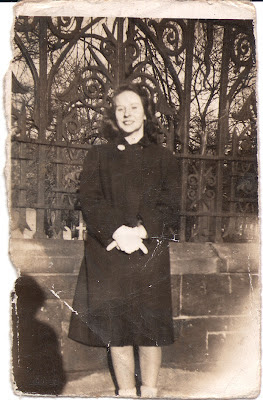 |
My father, Whit C. Bryan, next to Reddick Bryan's grave at the
Bryan Cemetery in Bienville Parish, Louisiana - 1981 |
Reddick Bryan, my great-great-grandfather, must have liked adventure and the
unknown. He left his home in North Carolina to settle in the frontier in
Georgia and later to settle in newly owned federal lands in Louisiana. Both
times, he gave up his home where he had family and established churches,
schools and community. In Louisiana, Reddick was a slave owner and had a
plantation where he grew cotton and lived in a two room dogtrot log cabin. When Reddick died, at age 71 on January 12,
1864, two of his sons were away, fighting for the Confederate Army. His estate,
valued at $27,500, included Confederate money and numerous slaves.
According to the obituary, Reddick was a member of the
Methodist Church for more than 40 years. This leads me to believe that he
became affiliated with the Methodist Church about the time that he married
Elizabeth Regan in 1821. Information about Reddick’s family and other
genealogical or historical information is not found in this obituary. The newspaper
and author are unknown.
Reddick Bryan, along with other family members, is buried
in the Bryan Cemetery which is south of Ringgold on Highway 7 in Bienville Parish,
Louisiana.
OBITUARY
Died at his residence, on the 12th
ult, near Ringgold, Bienville Parish, La., Mr. Reddick Bryan age seventy
{paper torn and not ledgible}. It is painful indeed to record the death on one
whom we have known so long and who was bound to us by the strongest ties of
friendship’s affection- painful to know that one has gone who has been with us
so long. By this community, he will be sadly missed and the announcement of his
death will send an anguish to the hearts of all who knew him. To his Christian Friends and Brethren, a
light has gone out that will never on earth glow again, a pillar is broken and
crushed that will never be replaced. But
we should be resigned to know and consider that Death is an instructive mentor
as well as a mournful messenger; that the grave is the common lot of all, the
great leveler of all distinctions. But
at the same time we are taught, in one sense the good and great can never die
for the memory of their virtues and bright example will live through all coming
time into an immortality that blooms beyond the grave. The consolation of this thought should calm
our sorrows and cause us to exclaim, in the language of a poet,
“Why weep ye, then, for him who having
run
The bounds of man’s appointed years at
last,
Life’s blessing all enjoyed, life’s
labors done,
Serenely to his final rest has passed?”
The subject of this notice has long
enjoyed the blessings of religion. For
more than forty years he has been a strict and useful member of the Methodist
church. Possessing all the attributes of
a Christian Man, he was a kind and affectionate husband, an indulgent parent; as
{illedgible} his servants displayed their attachment to him in tears of anguish
over his grave. For several months his
health was bad, and he often spoke of death, but calmly, as if he would be
ready to obey the summons when it pleased God to call him. Let this thought comfort her, the partner of
his bosom, whose heart is now crushed and bleeding. Let her feel that it is good in the sight of
God for this affliction to come on her, for by the power of Christ’s
resurrection we joyfully anticipate the prospect of seeing that broken staff
erect and that beautiful rod clothed with celestial grace and blossoming in
undying life in the paradise of God.
Ringgold, La.
A. P. J.
Copies of this obituary and transcriptions were sent
to me by two Bryan/Regan descendants. Another transcription was found in The Wimberly Family History compiled by Vera
Meek Wimberly in 1979. Mrs. Wimberly wrote that she found the original obituary
in the scrapbook of Josie Bryan Cook, a granddaughter of Reddick Bryan. All
three transcriptions differed. This is my transcription of the copy of the
clipping sent to me by E. Regan Pruitt.
Diana
© 2012, copyright Diana Quinn































.jpg)